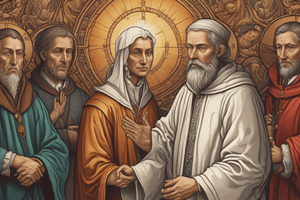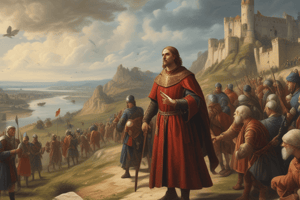Podcast
Questions and Answers
What was a significant outcome of the Protestant Reformation?
What was a significant outcome of the Protestant Reformation?
- It decreased the necessity for education among Christians.
- It led to the immediate decline of nation-states.
- It destroyed the unity of the Catholic Church. (correct)
- It unified all Christian denominations under the Pope.
What action did John Tetzel take that angered Martin Luther?
What action did John Tetzel take that angered Martin Luther?
- Forming the Lutheran Church.
- Writing the 95 Theses.
- Leading a movement against the Pope.
- Selling indulgences. (correct)
What factor contributed to the power struggle between nation-states and the Catholic Church during the Reformation?
What factor contributed to the power struggle between nation-states and the Catholic Church during the Reformation?
- The church's strict adherence to scriptural texts.
- Nation-states sought to disband all religious practices.
- Nation-states completely supported papal authority.
- The church raised taxes to support its activities. (correct)
What did Martin Luther accomplish between 1521 and 1526?
What did Martin Luther accomplish between 1521 and 1526?
How did the Protestant Reformation affect education?
How did the Protestant Reformation affect education?
What was the main reason Frederick of Saxony chose to protect Luther?
What was the main reason Frederick of Saxony chose to protect Luther?
What key belief about Holy Communion distinguishes Zwingli's view from that of traditional Catholicism?
What key belief about Holy Communion distinguishes Zwingli's view from that of traditional Catholicism?
Which of the following groups believed in adult baptism, rejecting infant baptism?
Which of the following groups believed in adult baptism, rejecting infant baptism?
What was a central concept of Calvinism established by John Calvin?
What was a central concept of Calvinism established by John Calvin?
Why did Henry VIII establish the Anglican Church?
Why did Henry VIII establish the Anglican Church?
What was the main focus of the Council of Trent during the Catholic Counter-Reformation?
What was the main focus of the Council of Trent during the Catholic Counter-Reformation?
What was the purpose of the Jesuits in the Catholic Counter-Reformation?
What was the purpose of the Jesuits in the Catholic Counter-Reformation?
Which of the following changes did Henry VIII NOT make in the Church of England?
Which of the following changes did Henry VIII NOT make in the Church of England?
Which event marked a significant shift back to Catholicism during Mary I's reign?
Which event marked a significant shift back to Catholicism during Mary I's reign?
How did Elizabeth I's policies differ from those of Mary I regarding religion?
How did Elizabeth I's policies differ from those of Mary I regarding religion?
Flashcards are hidden until you start studying
Study Notes
Overview of Reformation
- Protestants redefined the Christian Church by emphasizing faith and personal connection with God over works and authority.
- Between 1450 and today, the role of religion diminished significantly; in 1500, millions died for their faith, whereas currently only 10% of Germans believe in God.
Impact of Reformation
- The Reformation shattered the Catholic Church's unity.
- It provided new freedoms for Christians and empowered political leaders due to church conflict.
- Sparked a wave of educational growth as literacy became essential to read scriptures.
- Caused multiple wars across Europe, known as the Age of Religious and Civil Wars.
Background
- Rise of nation-states challenged the authority of the church.
- Economic burdens imposed by the church prompted calls for reform.
Catalyst for Reformation
- John Tetzel ignited Martin Luther's outrage by selling indulgences.
- Pope Leo X endorsed Tetzel’s indulgence sales to fund church projects.
- Martin Luther published the 95 Theses in 1517, protesting church practices.
- Luther tried to reconcile with the Pope but faced excommunication at the Diet of Worms in 1521.
- Luther translated the Bible into German, laying the groundwork for Lutheranism.
Key Figures
- Frederick of Saxony protected Luther, resisting authority from both HRE and the Pope.
- The Diet of Augsburg in 1530 called for Christian unity against external threats and articulated key Protestant beliefs in the Augsburg Confession.
Divisions Within Protestantism
- Ulrich Zwingli proposed consubstantiation, viewing communion as symbolic, contradicting the Catholic view of transubstantiation.
- Anabaptists championed adult baptism and communal property, leading to severe persecution for views against the Trinity.
- John Calvin introduced Calvinism, emphasizing predestination, which became widely practiced by French Protestants, known as Hugenots.
Reformation in England
- Henry VIII, initially “Defender of the Faith,” broke from the Catholic Church to seek a divorce, establishing the Anglican Church.
- Excommunication followed his marriage to Anne Boleyn, and he declared himself head of the Church of England through the Act of Supremacy.
- Edward VI advanced Calvinist reforms with the 39 Articles, while Mary I attempted to revert England to Catholicism through persecution.
- Elizabeth I reinstated Protestantism with a policy of religious tolerance, prioritizing loyalty to the state over strict religious adherence.
Catholic Counter-Reformation
- The Council of Trent (1545-1563) affirmed Catholic doctrines and called for reforms in church practices but made no fundamental doctrinal changes.
- Papal decrees included excommunication of Protestants and the establishment of the Inquisition.
- The Jesuits, a new religious order founded by Ignatius of Loyola, focused on education and global missionary work, reinforcing Catholic teachings.
Studying That Suits You
Use AI to generate personalized quizzes and flashcards to suit your learning preferences.




